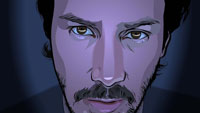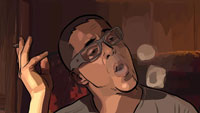In Richard Linklater’s A Scanner Darkly, Keanu Reeves plays “Agent Fred,” an undercover officer in America’s war on drugs. He’s so deeply undercover that he’s become a drug addict himself, losing touch with reality. So the irony is painful when Agent Fred is ordered to focus his investigation on one junkie in particular … himself.
Sound a bit familiar? Like Ridley Scott’s Blade Runner and Steven Spielberg’s Minority Report, A Scanner Darkly is based on the science fiction of Philip K. Dick. All three introduce us to law enforcement officers who begin by tracking criminals and end up running from the law, dismayed at what they’re learning about themselves.
But where Blade Runner and Minority Report borrowed the main ideas and added all kinds of violence and thrills, Linklater’s movie is actually faithful to Dick’s novel. A Scanner Darkly is true to Dick’s disillusioned, drug-addled, deadbeat characters. It’s a much more thoughtful film—challenging, meditative, and sad, just the way Dick intended it.
Scanner focuses on the small Anaheim community in which Agent Fred pretends to be a dealer. His “friends” are mopey slackers, tormented by the distortions brought on by a cruel, enslaving drug called “Substance D.” (The “D” may stand for death, disintegration, or despair.) “You’re either on it,” says addict James Barris, “or you haven’t tried it.”
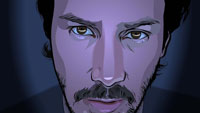
As his brain reels with foolish fantasies, Barris (Robert Downey Jr.) lectures others on things he knows nothing about—guns, the chemistry of narcotics, and government conspiracies. He has a captive audience. Wide-eyed and paranoid, Ernie Luckman (Woody Harrelson) is a typical southern California stoner, prone to freaking out. But Luckman is stable compared to Charles Freck (Rory Cochrane). Freck is a wreck who resembles The Lord of the Rings’ Gollum in his fits of twitching and terror. In the opening scene, he obsessively scrubs himself and his dog, convinced that they’re both besieged by giant aphids.
The guys are attracted to Donna Hawthorne, the sexy girlfriend of their housemate Bob Arctor. But Donna (Winona Ryder, in a welcome return to intelligent moviemaking) responds to Substance D by loathing the thought of physical intimacy. This drives Bob crazy. Unable to consummate his relationship with Donna, he uses drugs to buy sex with someone else, which leads to even nastier surprises.
What the group doesn’t know is that their friend Bob is actually Agent Fred. Behind their backs, Fred is documenting their crimes with elaborate surveillance equipment.
But the drugs are tearing Fred’s endeavors apart. The two hemispheres of his brain are fighting with each other, troubling his sense of identity. Is he really a cop pretending to be a dealer? Or is he a dealer who excuses his habit by posing as a cop?
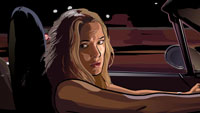
To give audiences a palpable sense of Fred’s delusion, Linklater uses the same style of animation that made his earlier film Waking Life so hypnotic. Animators “paint” over footage of the actors’ performances, using an innovative computer process called “rotoscoping.” In this way, these cartoon characters become hauntingly lifelike, preserving real movements, gestures, expressions, even scenery. Their outlines are unstable, and so is their environment, keeping us caught in a constant state of questioning the film’s “reality,” just as its characters do. It’s like living in a Kafka nightmare—a person chatting in your living room might suddenly transform into a cockroach.
The animators’ greatest accomplishment is the realization of the “scramble suits”—the agents’ full-body disguises. Made from an electrical fabric, conglomerations of human features mix and match on their surface, disguising the wearer with a random collage of races, ages, hairstyles, and outfits. This gives the agents anonymity at the office, protecting their operations. The scramble suits made Dick’s novel unfilmable for decades. Through Linklater’s technique, they’re astonishing.
And they’re more than just a special effect. The suits make us think about ways in which people are pressured to meet society’s shifting expectations, or how they lose their individuality by conforming to “the system.” And they suggest that any agent of authority may conceal secret agendas within the “costume” of duty.
Truly scrambled, Agent Fred becomes increasingly suspicious of his employers. Could it be that the government actually benefits from this epidemic of addiction? After all, it’s easy to manipulate a nation of apathetic zombies.
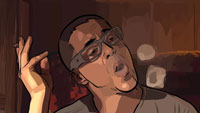
Published in 1977, reflecting the drug culture of his day, Dick’s book is remarkably relevant to current events. He imagined a futuristic 1994, and many of his predictions were close to the mark. Newspapers report that governments are using powers of surveillance to monitor their own people. And drugs—legal and illegal—continue to wreak havoc on young minds. Media, the Internet, and a proliferation of technological distractions are cultivating generations of naïve, isolated, self-indulgent, and easily manipulated individuals. And it’s increasingly difficult to sort out which politicians, leaders, and news sources can be trusted. Meanwhile, we’re bombarded by those who compete to sell us the latest salve for our frustrations.
Thus, Scanner works as a relevant and timely parable.
And yet, it’s rather difficult to sit through. As in the novel, Barris, Luckman, Freck, Hawthorne, and Arctor’s meandering conversations occasionally amuse. One hilarious sequence involves an argument over whether a bicycle has eight or twelve speeds. Viewers may find themselves growing weary of these verbose, dysfunctional fools.
As a result, I ended up with mixed emotions about Linklater’s film.
On the one hand, nobody makes better movies about slackers and the search for meaning. The animation is fantastic, and this is Reeves’ best role since, well, the first time he played a delusional stoner—in Bill and Ted’s Excellent Adventure. And even though I hoped for more excitement, Scanner isn’t supposed to be a thriller. It’s a eulogy for Dick’s despairing generation. It’s a desperate search for mercy and hope.

Linklater’s a fine director with an entertaining subject—Before Sunrise, The School of Rock, Dazed and Confused—but this is hardly “entertaining.” Which brings me to “on the other hand.” Scanner‘s characters are somnambulistic and maddening. It’s a bore. It lacks suspense. And these characters are miserable company, representing a truthful portrayal of human frailty and folly.
Linklater admirably gives us a sense of the author’s broken heart. Dick struggled with drugs himself. He knew his own weakness, and thus had a deep sympathy for his friends who were worse off. This movie may help despairing people see themselves in the mirror, and draw back from the abyss. It may caution people about the dangers of drugs. And it may sensitize others to the suffering and emptiness that turns lost souls into junkies.
And if I’m honest, I must admit that I can relate to these characters. I’ve never experimented with drugs, but I know what it’s like to become frustrated with the world and with myself. I’ve been a double-minded man. I’ve done my share of blaming society for my own mistakes. It’s much easier to drown my woes in shallow distractions than it is show discipline and dedicate myself to making a difference.
Gradually, Agent Fred sees the limitations of government surveillance. And he fears that no human being can see things clearly enough to save them from themselves, much less save the world.
“What does a scanner see?” he asks. “Does a scanner see into me—into us—clearly or darkly? I hope it [sees clearly] … because I can’t any longer see into myself.” And he concludes, “If the scanner sees only darkly, the way I myself do, then we are cursed … and we’ll wind up dead this way, knowing very little and getting that little fragment wrong too.”
It’s reminiscent of 1 Corinthians 13:12, where Paul writes that we currently see “through a glass darkly,” but someday we will see God face to face, and all will become clear. Today, if we lean on our own faulty understanding, we’re hopeless. We must place our faith in a God of grace, who sees all things clearly, who loves even drug addicts unconditionally, who offers forgiveness for mistakes and comfort for our fears, and who promises to raise us up out of our ruined state.
Talk About It
Discussion starters- Does the film give us a revealing picture of the effects of drugs on users?
- Besides drugs, what forces and trends in our society can be seen as “intoxicating” the public? What weakens our ability to think clearly, act effectively, and respond with conscience?
- Who in this film can you relate to?
- What is it that these characters are really longing to find? Do you sense any hope for these characters?
- What does Scripture say about “a double-minded man”? How can we avoid being consumed by doubt? (Read James)
The Family Corner
For parents to considerA Scanner Darkly is rated R for drug and sexual content, language and a brief violent image. It’s a science fiction film for discerning adults. Characters abuse drugs, play with guns, drive recklessly, use profanity, take the Lord’s name in vain, and engage in reckless sex. Two scenes include animated nudity. All of this is employed to depict the emptiness and destruction brought on by drug addiction and despair.
Photos © Copyright Warner Independent
Copyright © 2006 Christianity Today. Click for reprint information.
What Other Critics Are Saying
compiled by Jeffrey Overstreetfrom Film Forum, 07/20/06“Drugs are presented as singularly unattractive,” notes Harry Forbes (Catholic News Service), “and the film ends on a somber note … But even if there’s no romanticizing of the drug culture, the nightmarish milieu is almost unremittingly sordid and unpleasant … and despite the animation technique (which adds a drug-tripping ambience), the film is surprisingly dull and talky.”
Mainstream critics are divided over whether the film is fantastic or forgettable.
from Film Forum, 07/27/06Josh Orendorf (Relevant) says, “The work was easily worth the time invested … as the finished product is, undeniably, an aesthetic masterpiece. Unfortunately, the visual strength of Scanner exhausts itself by the end of the film, proving unable to bear the brunt of a sub-par storyline.”

